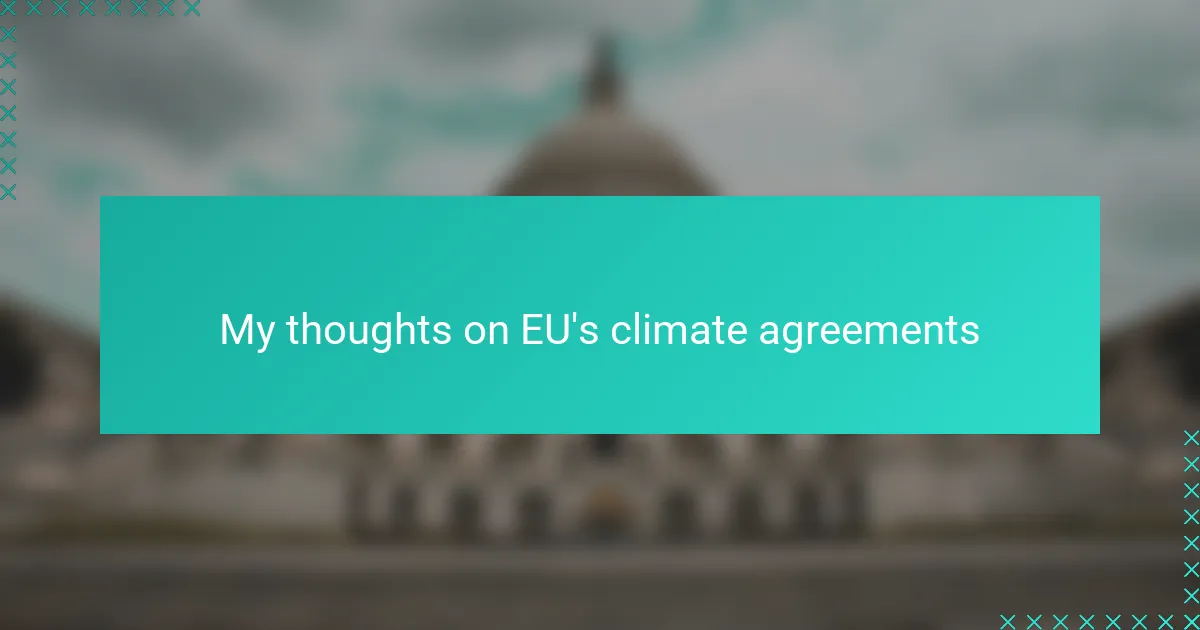Key takeaways
- The EU aims for climate neutrality by 2050 through the European Green Deal, necessitating a transformation across all economic sectors.
- Challenges include uneven commitment among member states, aligning economic interests with climate targets, and ensuring robust compliance mechanisms.
- Progress has been made, but the effectiveness of policies like the Emissions Trading System is questioned amid tensions between economic growth and environmental responsibility.
- Future success hinges on citizen engagement, technological innovation, and the EU’s ability to foster global partnerships for a unified response to climate change.
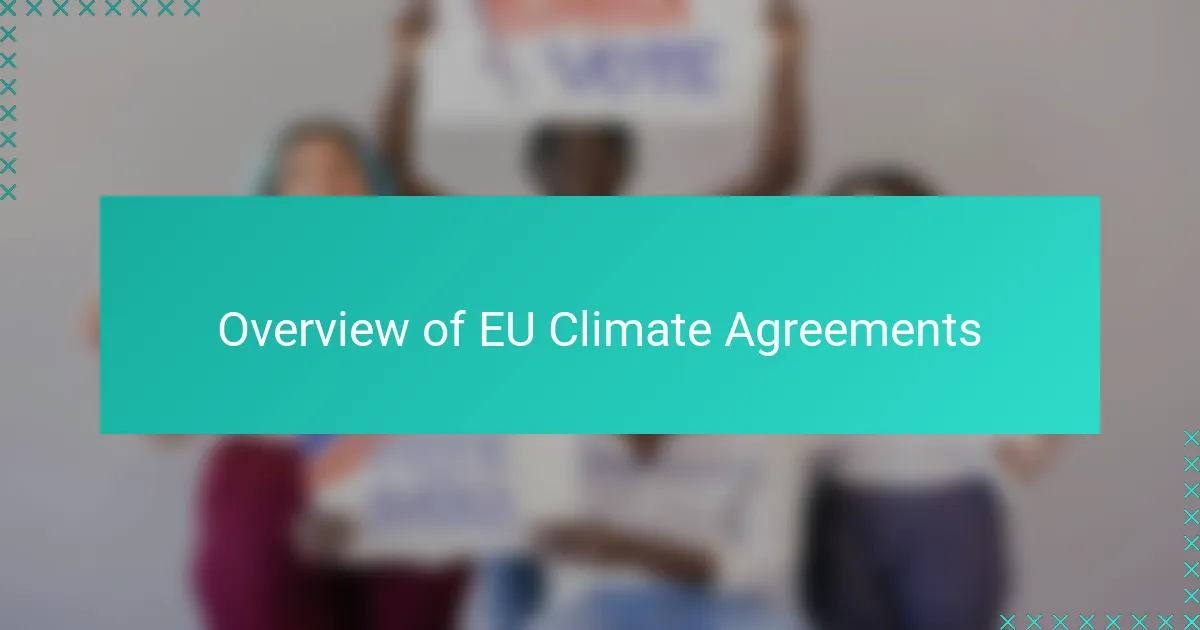
Overview of EU Climate Agreements
The European Union has positioned itself as a global leader in climate policy through a series of ambitious agreements aimed at reducing greenhouse gas emissions. From my perspective, these agreements reflect both a political commitment and an acknowledgment of urgency that few other regions match. It’s compelling to see such coordinated efforts, but I often wonder—are these agreements bold enough to truly match the scale of the crisis?
One of the core elements of the EU’s approach is the European Green Deal, which sets a target for climate neutrality by 2050. When I first read about this, I was struck by the sheer scope of such a goal—it’s not just about cutting emissions but transforming nearly every sector of the economy. This comprehensive vision represents a kind of hope, but also a heavy responsibility. How will member states balance economic growth with such stringent environmental commitments?
Another critical piece is the legislative framework that drives accountability, such as the Emissions Trading System. In my opinion, mechanisms like this show a pragmatic angle to the agreements—using market forces to incentivize change. Yet, I can’t help but feel a tension here: can economic incentives alone spark the deep, systemic shifts our planet desperately needs? This question lingers in my mind every time I reflect on the EU’s climate strategy.
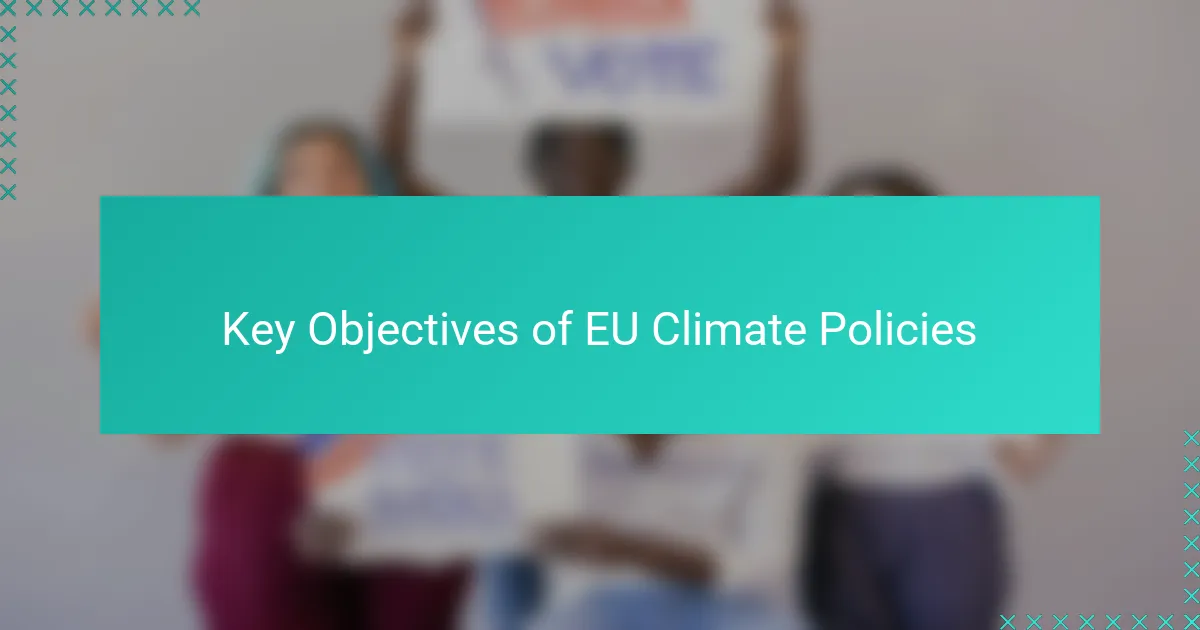
Key Objectives of EU Climate Policies
When I consider the key objectives of EU climate policies, the emphasis on drastically reducing greenhouse gas emissions stands out most clearly. It’s not just about meeting numbers on a chart; it feels like a moral imperative to me, aimed at protecting future generations from a deteriorating planet. This goal is ambitious, yes, but essential—how else can we respond to the mounting evidence of climate change?
Another objective that resonates with me is the push for climate neutrality by 2050. This target isn’t just a distant deadline; it represents a fundamental shift in how European societies produce and consume energy. I can’t help but admire the boldness of this vision, though I often wonder what sacrifices and innovations will be necessary to turn it from aspiration into reality.
What truly strikes me is the EU’s focus on integrating sustainability into economic growth. The idea that environmental responsibility and economic development must go hand in hand feels like a delicate dance. From my experience observing global politics, this balance is where policy often falters, yet the EU seems determined to prove that green growth isn’t just a slogan but a viable path forward.
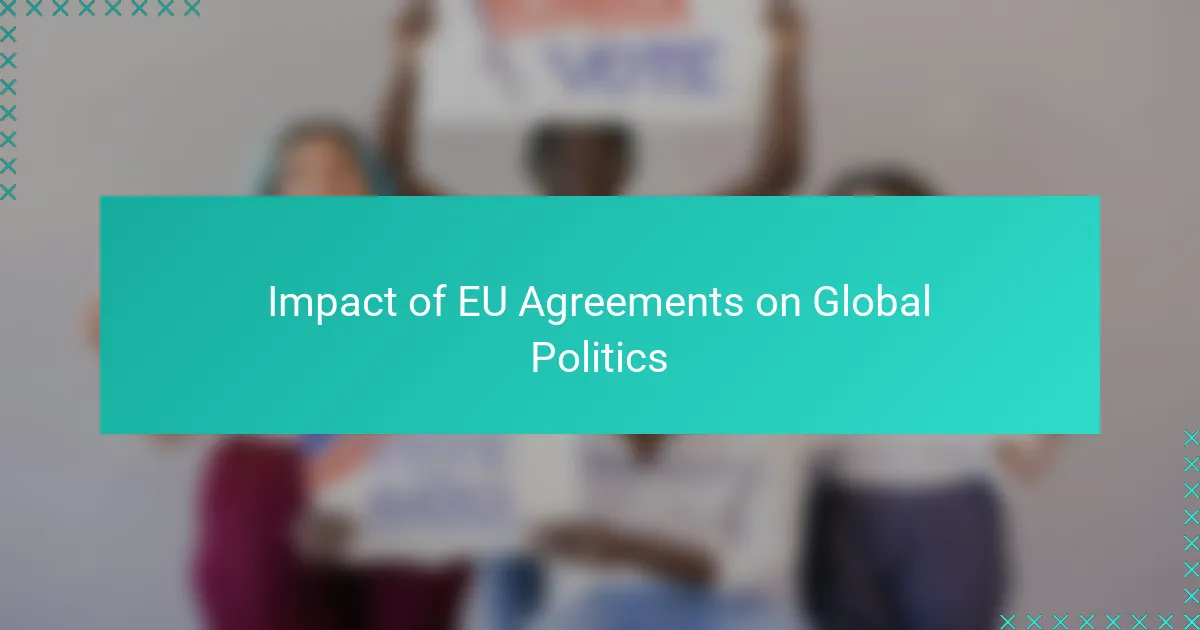
Impact of EU Agreements on Global Politics
The impact of the EU’s climate agreements on global politics is something I find both inspiring and complex. On one hand, the EU sets a benchmark that other nations feel pressured to follow, creating a ripple effect in international negotiations. Yet, I often ask myself—is this influence enough to reshape global power dynamics, or does it mainly reinforce existing alliances?
From my observations, the EU’s leadership brings a sense of urgency and responsibility that challenges the often fragmented approach seen elsewhere. This shift compels countries worldwide to rethink their own climate strategies, which in turn affects global economic and diplomatic relations. Still, I wonder how long this momentum can last without broader participation from major emitters outside Europe.
Reflecting on recent summits, it strikes me how the EU’s agreements have turned climate policy into a geopolitical tool. It’s no longer just an environmental issue but a matter of strategic positioning and soft power. Have we reached a point where climate leadership equates to political clout? Based on what I’ve seen, that question is becoming central to global politics today.
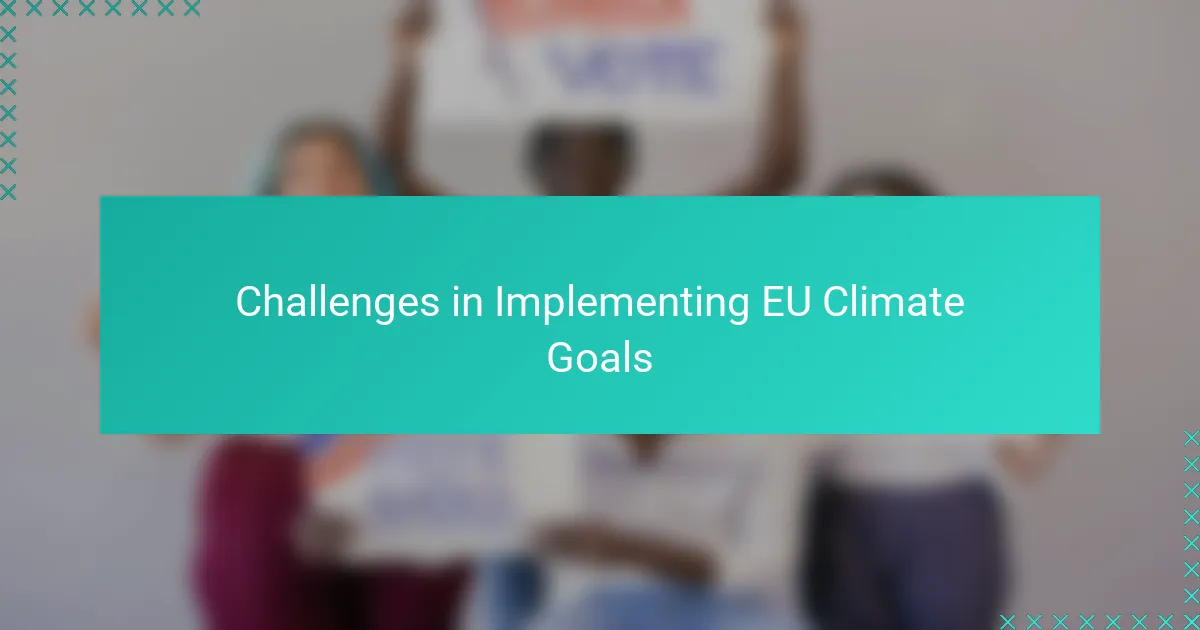
Challenges in Implementing EU Climate Goals
One of the biggest hurdles I see in implementing the EU’s climate goals is the uneven commitment among member states. Some countries are more willing or economically able to push for rapid change, while others face political resistance or rely heavily on fossil fuels. It makes me wonder—how can a union maintain unity when priorities and capacities vary so widely?
Another challenge lies in aligning economic interests with environmental targets. From what I’ve observed, industries pressured by regulations often push back, fearing job losses or increased costs. Balancing these concerns with the urgency of climate action seems like walking a tightrope—do we push harder and risk economic fallout, or move slower and risk environmental disaster?
Lastly, I can’t ignore the complexities of enforcing compliance. Even with ambitious policies, the absence of robust monitoring and penalties might weaken progress. It’s frustrating to think that well-intentioned agreements could falter simply because implementation mechanisms aren’t strong enough. How can the EU ensure its climate promises translate into real-world results?
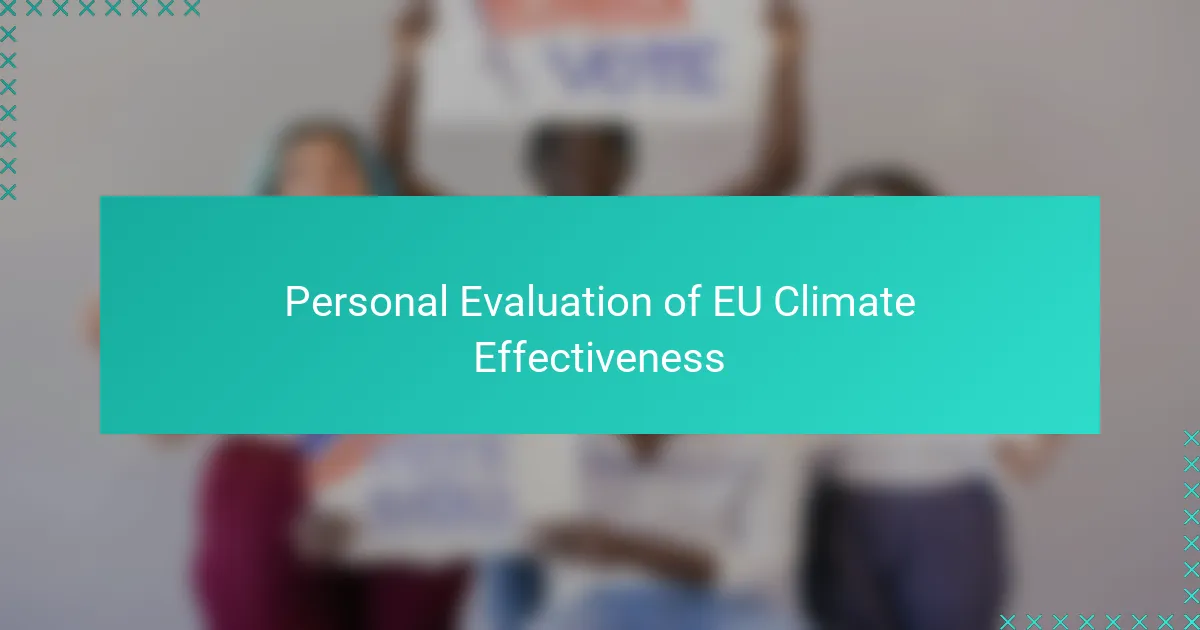
Personal Evaluation of EU Climate Effectiveness
When I evaluate the effectiveness of the EU’s climate agreements, I find myself both impressed and cautiously critical. The EU has crafted a framework that feels ambitious on paper, yet I often question whether the actual outcomes match these lofty aims. After following these policies for years, I notice progress is tangible but uneven, leaving me wondering if the current pace is sufficient given the urgency.
From my experience, the EU’s use of market-based tools like the Emissions Trading System signals a smart mix of pragmatism and innovation. However, I’ve also seen occasions where economic interests seem to slow down deeper reforms, which makes me skeptical—can market incentives alone drive the transformational change the planet demands? It feels like there’s still a gap between policy intentions and real impact on the ground.
What strikes me most is the resilience of the EU’s commitment despite political and economic hurdles. I recall discussions where skepticism about member state solidarity was high, yet the bloc often manages to renew its climate vows and raise targets. This persistence gives me hope, but I’m left asking: will this determination be enough to push beyond incremental progress and achieve the bold change the climate emergency calls for?
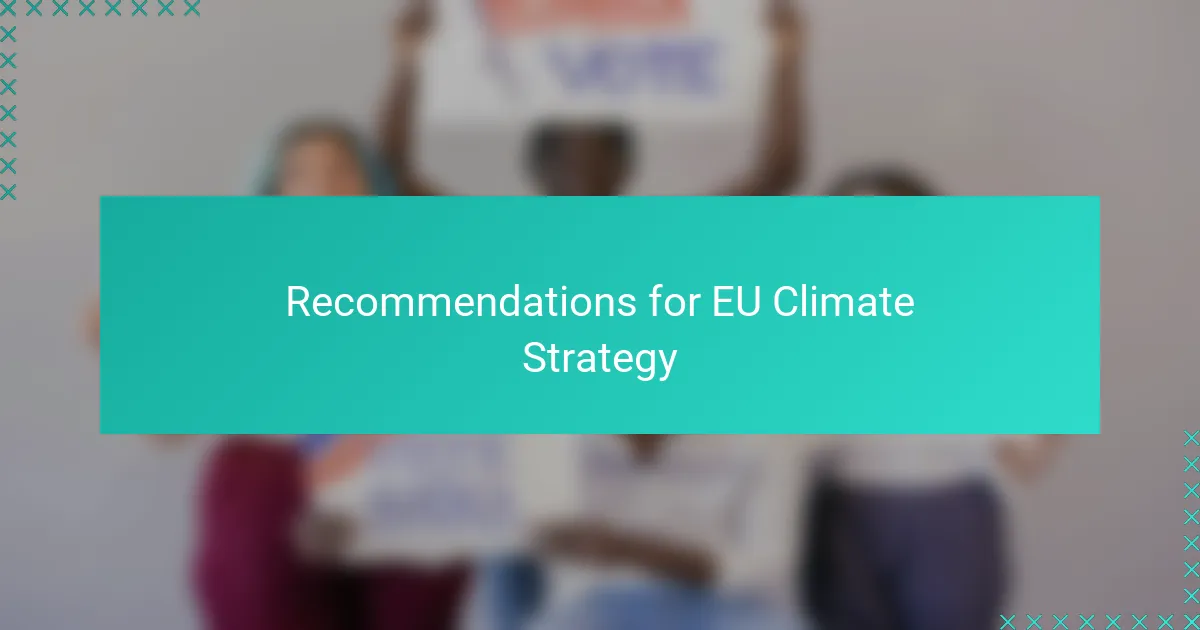
Recommendations for EU Climate Strategy
If I were to recommend next steps for the EU’s climate strategy, I’d stress the importance of deepening financial support for member states struggling with the transition. From my experience, without targeted aid and technology transfer, the gap between ambitious goals and on-the-ground realities will only widen. Isn’t it crucial that the EU not only sets high targets but also ensures everyone can realistically reach them?
Another recommendation I hold firmly is enhancing transparency and accountability mechanisms. I’ve seen how unclear progress reports or weak enforcement can erode public trust and political will. Could the EU benefit from more rigorous, publicly accessible monitoring that empowers citizens and stakeholders to hold decision-makers accountable? In my view, this could be a game-changer.
Finally, I think the EU should foster stronger collaboration with global partners beyond its borders. Climate change isn’t confined by geography, and neither should ambition be. Reflecting on international dynamics, I believe the EU’s leadership could shine brighter if it actively builds inclusive coalitions that share technology and policy innovations. Can Europe’s climate diplomacy inspire a truly global movement? I’m convinced it can—but only if it commits to bold, outward-looking partnerships.
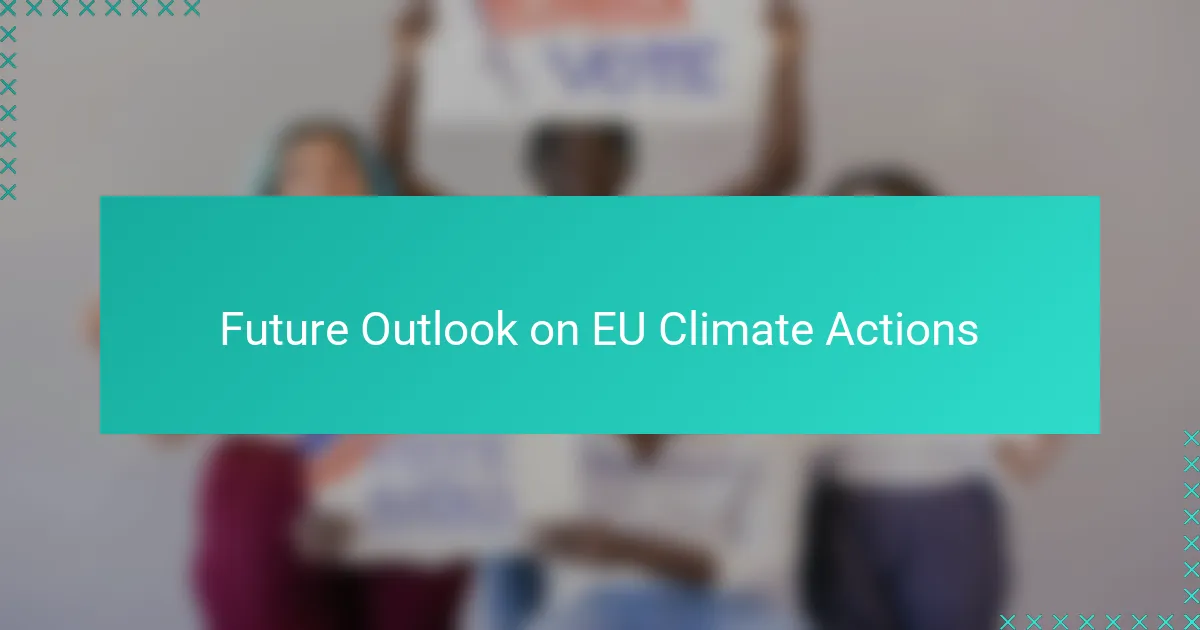
Future Outlook on EU Climate Actions
Looking ahead, I see the EU’s climate actions teetering between promise and challenge. The goal of climate neutrality by 2050 is inspiring, yet I can’t help but wonder if the current political will and economic structures will sustain the momentum needed over the next 30 years. From what I’ve observed, long-term vision is one thing, but consistent, coordinated steps year after year are what really count.
I also notice emerging trends that could redefine EU climate policies, like the push for stronger carbon border adjustments and more ambitious targets before 2030. These developments suggest the EU isn’t complacent, but they also raise questions for me: will member states agree on even tougher measures, especially when some economies still rely heavily on fossil fuels? Balancing urgency with fairness feels like walking a tightrope.
Most importantly, I feel the future of EU climate actions depends heavily on citizen engagement and technological innovation. In conversations I’ve had with people across Europe, there’s a rising expectation that governments do more than talk—that they deliver real change that touches everyday life. Can the EU harness this energy and translate it into policies that are both bold and broadly supported? That, to me, is the defining challenge of the years ahead.
